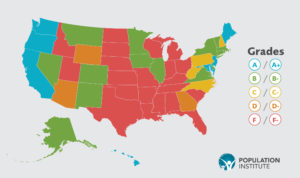For the first time since the inception of the 50 State Report Card on Reproductive Health and Rights eight years ago, the U.S. as a whole has received a failing grade. The new report card covering 2019 was issued by the Population Institute today, two weeks before the U.S. Supreme Court is scheduled to hear oral arguments in June Medical Services v. Russo, a Louisiana case that could result in further erosion of Roe v. Wade and abortion rights.
The Population Institute’s report card is the most comprehensive of its kind, tracking multiple indicators of reproductive health and rights, including access to family planning, sex education, and abortion services. Over the past eight years the report card has documented a steady erosion of reproductive rights at both federal and state levels.
Among the many setbacks at the federal level over the past year was the new set of rules finalized for Title X, the 50-year old federal program that supports family planning clinics serving low-income households. Commonly known as the “domestic gag rule,” the new rules prohibit Title X-funded physicians and staff from counseling patients on abortion or referring them to abortion providers, among other restrictions. This change forced Planned Parenthood and other trusted family planning and reproductive health providers to drop out of the program, slashing the Title X network’s capacity in half. At the same time, the Trump administration is awarding Title X grants to “crisis pregnancy centers” run by staunch anti-abortion advocates, some of which do not even offer contraceptive services to clients.
The Trump administration is also seeking to cut federal support for comprehensive, evidence-based sex education curricula that are proven to reduce teen pregnancy rates. In their place, the administration is promoting “sexual risk avoidance” programs that embrace an “abstinence-only” approach, which evidence shows fail to reduce teen pregnancy.
In addition to moving the Supreme Court to the right with the appointments of Brett Kavanaugh and Neil Gorsuch, the U.S. Senate has confirmed dozens of Trump-nominated judges to lower federal courts, raising concerns that the federal courts will further curb abortion rights and access to reproductive health care services. A more conservative federal judiciary is also likely to issue rulings adversely affecting Title X, as well as contraception coverage and LGBTQ protections under the Affordable Care Act.
At the state level, the divide between states that promote reproductive health and rights and those that restrict them continues to deepen.
20 states received a failing grade. They include Alabama, Arkansas, Florida, Idaho, Indiana, Kansas, Kentucky, Louisiana, Michigan, Mississippi, Missouri, Nebraska, North Dakota, Ohio, Oklahoma, South Carolina, South Dakota, Tennessee, Texas, Utah, and Wisconsin. Several of them passed abortion restrictions that defy the Roe v. Wade guidelines in hopes of persuading the U.S. Supreme Court to overturn the landmark ruling.
Meanwhile, seven states received an “A” in this year’s report card, including California, Hawaii, Maine, Maryland, New Jersey, Oregon, and Washington.
“The political war over reproductive health rights is far from over, but the legal and regulatory battle lines have been drawn, and the stakes could not be higher, said Robert Walker, president of the Population Institute. “If the opponents of reproductive health and rights have their way, abortion, contraception, other reproductive health services, and even basic health care, will be pushed even further out of reach for low income individuals.”
“It is imperative we remember those who are most impacted when we fail to provide access to safe and affordable reproductive health care for all,” said Jennie Wetter, the Population Institute’s director of public policy. “Many people of color and low-income individuals are already struggling to access reproductive health care services. This report card is a call to action for all those who care about reproductive health and rights.”

Methodology
The Population Institute report card ranks each of the 50 states and the District of Columbia according to key criteria as follows:
- Thirty percent of the grade is based on measures of effectiveness. This includes the latest available data on the teenage pregnancy rate (15%) and the rate of unintended pregnancies (15%).
- Twenty-five percent of the grade is based upon prevention. This includes mandated comprehensive sex education in the schools (15%), nurses authorized to dispense medications (5%), and minors’ access to contraceptive services (5%).
- Twenty-five percent of the grade is based upon This includes if states are expanding Medicaid under the Affordable Care Act (15%), Medicaid eligibility rules for family planning (5%), and restrictions of insurance coverage of abortion (5%).
- 20 percent of the grade is based upon clinic access. This includes abortion restrictions (10%), TRAP Laws (5%), and percent of women living in a county without an abortion provider (5%).
Based on their scores, each state receives a “core” grade (A, B, C, D or F), but some states received an additional “plus” or a “minus” for factors not reflected in the core grade.
Special thanks to the Guttmacher Institute whose research made the report card possible.